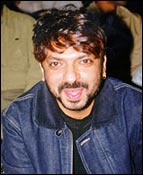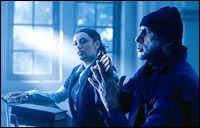 Sanjay Leela Bhansali has turned a corner in his life. From the vibrant and colourful movies that he has directed earlier like Hum Dil De Chuke Sanam and Devdas, comes a very seemingly stark film Black.
Sanjay Leela Bhansali has turned a corner in his life. From the vibrant and colourful movies that he has directed earlier like Hum Dil De Chuke Sanam and Devdas, comes a very seemingly stark film Black.
The film has the unique story of a blind, deaf and mute girl (Rani Mukerji) being tutored by her teacher (Amitabh Bachchan).
On the eve of its release, Bhansali talks to Deputy Managing Editor Vaihayasi P Daniel about Black.
What is your perception that audiences are looking for something different based on?
There is a sense of exhaustion in the audience of going every Friday and seeing the same routine. It is not taking them anywhere. With multiplexes taking off in such a big way, audiences have changed completely.
![]()
More on rediff.com!
![]()
![]()
![]()
![]()
Ash on kissing, Hollywood & Shabd![]()
The National Award winners![]()
Aamir romances Soha Ali Khan!![]()
![]()
![]()
Before there was such a diverse audience sitting in one theatre. The lower stalls would have a different temperament and socio economic (reasoning). Now, the audience has become very uniform. The multiplexes audience has one way of thinking. When they are all sitting together temperamentally, there is room for a filmmaker to reach out to a far larger audience in a comfortable way.
I feel the access to so much television, computer, Internet, web sites has made the Indian audience far more educated today than they were five or 10 years ago. There is a huge change in mindset.
There is also access to world cinema. Look at how beautifully world cinema is doing. They have done more business than Indian films have done if you look at the figures of the dubbed versions or English versions.
I feel there is change. How contrary (this change is) we will know in one or two years starting with Black. We will get to know where the mainstream is heading. It is very exciting.
 You have flouted the usual rules while casting? Why so many new faces?
You have flouted the usual rules while casting? Why so many new faces?
Amitabh Bachchan-Rani Mukerji are very mainstream people doing very un-mainstream roles. But yet, they want to reach out to mainstream film audiences with these roles.
I have also taken a lot of theatre people because I think when you take predictable actors or known faces all the time you feel you are hearing the same lines again and again in different ways.
The set of reactions, the approach to acting, the process of acting becomes far more charming when you are a new person. You are exploring and never too sure how it is all going (to work). The uncertainty keeps you going. They (theatre actors) give much more than the kind of people I have worked with in mainstream cinema.
But Amitabh Bachchan is a very known face.
Yes, Amitabh Bachchan is a big star. But what he has agreed to do and what he has achieved in this film is remarkable. He brings the audience in because of his star power. Star power is very important because they have a huge following and people come to see them. And when they come to see them, they at least get a chance to see something different. It is a chance for the actor to show something different.
It is absolutely important to balance stars with newcomers so the whole chemistry and ambience between people, who have never worked before, becomes far more explosive and exciting.
 Aren't you taking a risk producing a film with a blind heroine and unconventional leading man?
Aren't you taking a risk producing a film with a blind heroine and unconventional leading man?
What's life without risks? When I made Hum Dil De Chuke Sanam, everybody said in India you can never have a husband say that I am uniting my wife with her lover. The male audience would reject it and it is a male audience and hero-oriented industry.
They said everybody had seen Devdas 11 times so what is the point in you telling the same story for the 12th time at Rs 500 million.
These are risks you have to take. People get excited watching you walk the thin line. Suddenly they want how you will do it. You become far more exciting to them. They want to join you somewhere halfway in this journey. They also want to tread that path and say, 'oh this is wonderful, we never thought of it this way and we never went this way.'
They want to see if he crosses or does he fall, does he survive... Even if he falls, at least there is an appreciation of having taken the chance of walking that thin rope or wire.
You can do a formula film and walk the conventional path but it may not work at all. I mean, how many formula films have worked in the last year?
There has to be risk. That is how the energy of the filmmaker comes across. Your shot breakdown changes, your approach to voice, dialogues and props changes if you are doing different things.
If I had done one more spectacular cinema with song and dances, in how many more ways could I have shot a pillar or curtains or girls dancing in lehngas? It would have been so predictable and boring. I would have got saturated as a filmmaker and the audience would have got saturated with my kind of cinema. I don't want that boredom to creep in.
But it is not just about boredom. Deep down, I wanted to do something and I did it. People said it is hara-kiri. They said you have got so much success with Devdas and you have so much following. Why don't you continue with the same? I will only be able to make what gives me satisfaction deep down. I should do what comes from deep down inside me.





